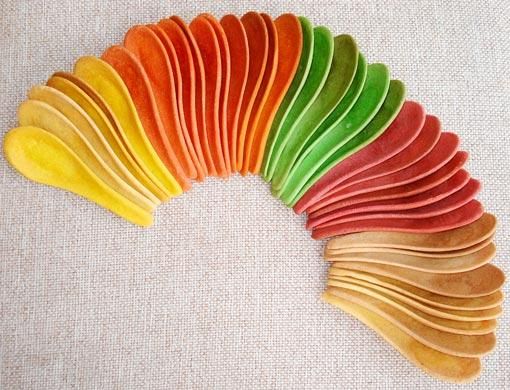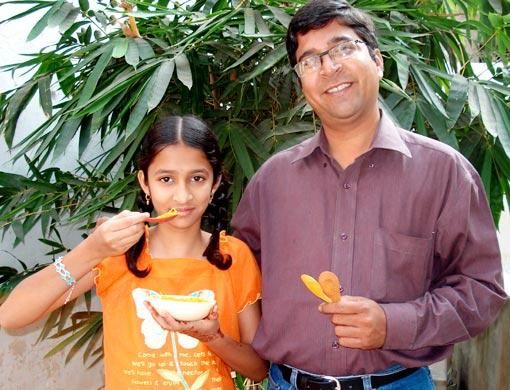New Delhi: You've heard of silver, gold, perhaps even crystal-studded cutlery. But ever laid your hands on edible cutlery?
Delicious forks, knives, spoons and chopsticks in vanilla, strawberry and pineapple flavours in attractive hues, ready to be gobbled up after a meal!
No? Well, this cutting-edge cutlery - manufactured by Hyderabad-based [in southern India's Andhra Pradesh state] entrepreneur Narayana Peesapaty of B.K. Environmental Innovations Private Limited - may soon be coming to a mall near you!
The products are already a hit in India with Peesapaty, a former scientist at the Institute for International Crop Research Institute for Semi-Arid Tropics (Icrisat) - and a Forest Management graduate with two decades of consulting and research experience behind him - supplying his produce to star-consecrated hotels and local grocery shops.
Enquiries
Enquiries, claims Peesapaty, are also pouring in from Singapore, New Zealand and Canada.
And with Japan and China's insatiable appetite for disposable chopsticks in the wake of their whittling natural resources, Peesapaty feels his edible chopsticks will give stiff competition to the disposable ones.
In fact he aims to corner a portion of the global disposable chopsticks market, which sees sales of around 24 billion units per annum in Japan and 35 billion units in China. The idea of edible cutlery struck the innovator midflight while he was digging into a meal with plastic cutlery. He did not find the plastic forks and spoons appealing. That set him off on his hunt for edible cutlery that need not be discarded after use. Those that would be nutritive and tasty enough to be eaten and also help save the environment.
Innovative
Peesapaty then set out to achieve this triple jackpot. After two years of R & D and test sales, the scientist say he went commercial in April this year. He has packed off supplies to UK, France and samples to US, Canada, Dubai and Russia.
Though it is too early to be looking at a turnover, he says, he has already sold Rs200,000 (Dh1,818) worth of products and is targeting a sales turnover of Rs50 million in 2009.
There's strong logic backing Peesapaty's eco-friendly venture.
According to him, plastic cutlery market is worth Rs10 billion per annum which is far larger than steel, glass or ceramic. Moreover, plastic cutlery - being disposable and non-biodegradable - causes enormous environmental damage.
To manufacture his innovative cutlery, therefore, the businessman uses sorghum, a corse grain known in India as "jowar", as its main ingredient.
Jowar has traditionally been an important source of fibre and nutrients such as folic acid, yet its domestic consumption has declined. B.K. Innovations is thus helping to revive jowar cultivation as consumers, especially those with diabetes, have shown interest in consuming edible cutlery as a nutritious snack.
He has spent much time and effort researching the suitability of various grains as base material for his products before he zeroed in on sorghum. Spinach gives the products the green shade, beetroot red and carrots brought the yellow hue.
In 2006, the entrepreneur applied for a process patent for producing edible cutlery. "Apart from the first-mover advantage, the flour combination, kneading process and mould designs are unique, creating substantial obstacles for this business," says Peesapaty.
Moreover, the concept didn't enthuse the venture capitalist community as his funding requirement was for the commercial launch of the product was Rs5 million "whereas most VCs like to invest at least $3-5 million in a project," elaborates Peesapaty.
Peesapaty commercially launched the product in April 2008 with 70 per cent of his Rs5 million investment coming from his own pocket. But his inability to ramp up operations frustrates the entrepreneur. He says his progress has been painstakingly slow due to infrastructure hurdles, non-availability of moulds and the lack of a well-oiled marketing machinery. "I need to ramp up my production to 500,000 spoons a day before my venture can be considered commercially viable," he says.
Therefore, to scale up the business, he has fleshed out a franchisee model through which he will offer machinery and trained staff, while the marketing support will be expected of the local partner. The entrepreneur currently has an all-women team of 20 employees "to do my bit for women's empowerment".
As B.K. Innovations scales up production, Peesapaty hopes to work in synergy with local jowar farmers. So what food for thought is Peesapaty next serving up? An edible plate that can be tweaked into pizza or burgers and edible sandwich wrappers! Bon appetite!














